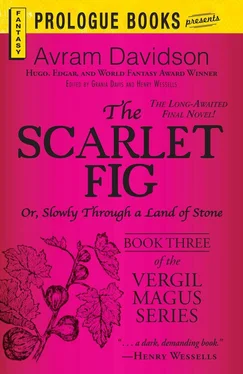“… Doge, I now have enough for parchment, pens, ink, pounce … one thing Doge’s boon and bounty cannot bring me … If I might come to the house of the sage Vergil and copy but one passage out of the great book Almagest … ?”
“Come whenso you will and copy what you please. I shall advise them at the door and inform them in the library. Might the hour of noon be to the Master Philosopher’s convenience? The light —”
It would not . “At the hour of — at the hour mentioned, according to my own calculation mathmatical, the most-favorable spirits would not be in the ascendant …”
So, thought Vergil; even Fortunatus feared the hour of noon, when, since men cast no shadows, one could not tell real men from false: the Demon, the Dukos, the Simulacre and the Sand-Jack shed no shade. Well, so be it. The sage Vergil, with a murmur and a gesture, made the Master Fortunatus free of whatso hour ever he might desire. The sage Vergil wore a civil face, yet, beneath the civil face, did he not smile a bittle? Beneath the civil face, he did smile … a bittle.
Making nought of his host’s thanks, swift he pressed him that he had a favor of his own to ask: see the philosopher startle in surprise. “Can the Master tell me ought of, how shall I call it, hath it yet a name? device and art whereby to depict things a-dwindle in the distance, yet all in proper ratio?”
Fortunatus understood instantly; “Proportion, this we call proportion and perspective, what would see perspectively?”
A bit amazed as, it seemed, being instantly understood. Vergil said, “Whatever you please … a man beyond houses, a house in between trees yet a farther away from them somewhat … a doorway in a building on a pier and beyond it the end of a pier and moored thereto a boat … whatever —”
Before Vergil had finished the words, Fortunatus had quickly taken up a much-used piece of papyrus (a more than-once-palimpsest it seemed), turned it over to its back on which the lineaments of whatever had been there were now but so many — or so few — grey ghosts, slapped it flat on the table and gave it another slap as it were he feared it would flee, else; took up a very small piece of charcoal, drew a single stroke with it, evidently discovered, suddenly, that it was blunt — as any boy too small to be trusted yet in breeches might have told him at a glance — gave it a sudden snap, as a hungry dog might give a morsel; and commenced, swiftly, almost savagely, to draw lines.
“Your ichnography is not enough,” Fortunatus breathed; stroke, stroke; “Your divisional construction is not enough;” stroke, stroke: did the strokes, what was the word? converge —? “Your sud ivisional construction is not enough,” stroke, stroke, stroke. “Observe, you Vergil —” (no mention of sage now: You Vergil. Well and good, he might not be “sage,” but he was, was he not? you Vergil. It was somehow a great comfort, much more than mere adjectives of flattery) … stroke … stroke “Observe, observe, observe! What is I say, essential, is your point of convergence; your vanishing point is essential …”
There on the old and soiled apyrus, amidst the strokes and lines, or upon the strokes and lines: suddenly there had appeared a doorway, beyond the doorway a mole or pier, perceptibly a distance, though no large distance, away; at the edge of the dock was, in scarce time at all, ‘a boat and all her apparell’ moored fore and aft, scratch, scratch, stroke, stroke. The wide gates of a harbor …
“It is not a fantasma!” exclaimed Fortunatus. Suddenly Vergil could smell the garlic, could he not smell, also, basil among the small pots of plants? it was some while yet before a seasoned cook would add the basil to the cook-pot — “Not a fantasma, at all, as say those fools, maledictions fall upon them! It is a truth, a philosophic truth , I say: the circle can be squared! ” He was panting now, as a man panteth upon a woman. “Gold projected out of dross, indeed! As well project dross out of gold!” One could hear, among the thick and heavy breath of passion, the hard sound of grinding teeth. In a second or a score of seconds, doorway, dock, ship, harbor, horizon were obliterated: and so was all knowledge of the presence of one You Vergil … or of anyone else alone. With an impatient gesture and an abrupt sigh, the old papyrus was swept onto the floor; Fortunatus swilled a half a mouthful of water, spewed it into his palms, rubbed his fingers clean of charcoal, rubbed them dry upon his robe.
Below and all around lay poverty, guarded by riches: Fortunatus cared not at all of either. Now with a bliss-filled sigh he drew an almost perfectly clean sheet of parchment from underneath an almost perfectly clean dust-sheet; and from another place he took up his compass and his protractor and his rule. Now everything in the world fell away from him as though uncreated. He and the pure forms, the Pure Forms , were quite alone, and might love one another to their endlessly full contentment: the Pure Forms: the line, the triangle, the rectangle, the circle and the square. Beauty bare. Beauty bare.
Vergil on tip-toe made his way from the room, paused only for a single backward glance before he turned and made his way down the crannied wall to the ground where the torchbearer awaited, open mouthed and silent and alone.
Silent as well, Vergil gestured to the man, and they set off together through the torch-pierced dark. One thing above all did wonder him, You Vergil, as they went.
He heard, in the otherwise silence, the chafing of the cicadas in the distant trees and fields, and the small but ceaseless lisping of the pitch in the burning torch.
Why, as though intent, did the flamingoe peer over Fortunatus’ shoulder as he drew upon his parchment?
One did not know. One Vergil did not know.

He felt that he must get him to the beach, and seek the comfort of the island-men: faint comfort though it was. On the way thither he saw the gleam of water through the trees; it was not the sea, it was a pool. He thought he might sink into it and refresh his body and be cool and clarify his mind. Trees and shrubs and scented flowers circled round. The man, without much taking thought, sank to his knees and cupped his hands to take up water and to drink. But before thrusting in his close-paired palms upturned, he paused and looked down. As in a dream he gazed and saw a face a-looing up at him.
It was not his face.
Neither was it the face of someone just behind him, for, as he quickly turned, there was no one behind him. As he moved his upper body around and looked again down, he saw that, reflected in the pool was a woman’s face, she seemed somedel troubled and concerned, and he knew that he had seen that face and that look before. And it came to him the word Huldah. He knew he knew it but he knew not how. Huldah meant the genet and the weasel, it also meant the cat, biss, one called it, familiarly. And yet. The Region called Huldah, what did that mean? No answer came, save that in a moment he was on his feet, walking swift away. He had not been swift but a little while ago. He had been as one who walks in a dream. For some reason he thought of the local nymphs, and of the brute impetuous beings who so lusted after them. Not only the satyrs lusted after nymphs; Priapus the son of Aphrodite, he: Protector of Goats, the randy creatures; Priapus “the Ever-Erect,” had lusted after the nymph called Lotis: had she appreciate the honor? no, not she, and when awakened by the braying of an ass (perhaps jealous of his ithyphallic rival), the nymph Lotis changed at once into a lotus-tree: a fact well-known. Whence had she the puissance? some guardian genie, doubtless. Some guardian genie doubtless it was which had substituted another’s face for that of his own, for to dream of seeing one’s own reflection in a dream was the best-known omen of one’s own impending death.
Читать дальше












